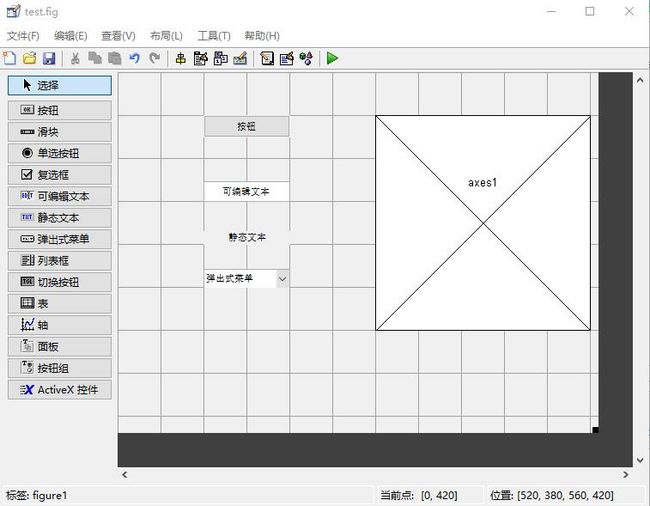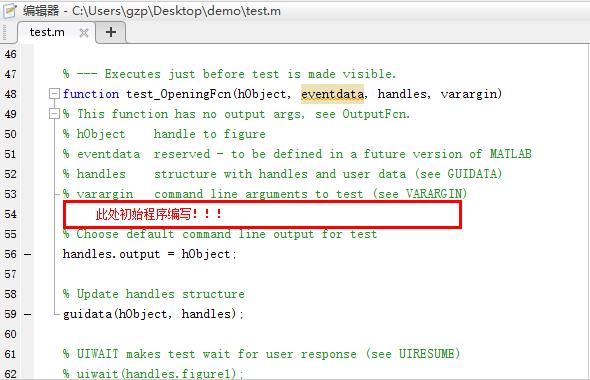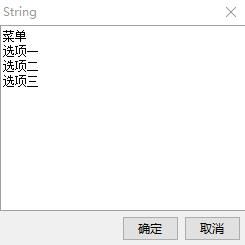Matlab GUI界面设计
摘要:本篇博文基于MATLAB2014a进行GUI设计。
1.启动GUI设计
命令行输入guide,回车。
![]()
即可得到下面的对话框,进行相关的选择和设置
点击确定,得到两个文件,一个是.m文件,另一个是.fig文件,需要说明的是,.m文件用于编辑GUI中控件所需要的回调代码,.fig文件可以用鼠标拖拽等比较简单的操作进行初始的界面设计。
2..fig文件控件布局
本篇暂时涉及按钮、可编辑文本、静态文本、弹出式菜单、轴的实现,拖拽这些控件到界面中,可以点击绿色三角形运行GUI看看效果。
双击任意控件可以弹出控件的属性检查器,这里可以更改控件的初始属性,并且可以查看控件的tag值,用于回调程序的句柄调用。
3.GUI初始程序编写
3.1.初始程序是界面运行时最先执行的程序,用于对控件等的一些初始设置,该部分的代码应该添加在.m文件的test_OpeningFcn(hObject, eventdata, handles, varargin)函数中。
插入如下代码,使得可编辑文本失效
set(handles.edit1,'enable','off');
3.2.按钮程序编写,使得可编辑文本生效,右击按钮->查看回调->Callback,输入
set(handles.edit1,'enable','on');3.3.可编辑文本程序编写,当可编辑文本框中输入文字后,在静态文本中显示出来
右击可编辑文本->查看回调->Callback,输入
set(handles.text1,'string',get(handles.edit1,'string'));3.4.弹出式菜单编写
双击弹出式菜单,调出属性编辑器,进行以下操作
输入相应文字,点击确定。
该部分函数编写,右击弹出式菜单->查看回调->Callback,输入
3.5.轴部分程序编写
为了简单起见,这部分内容写在程序开头,作用是显示了一个正弦曲线
代码如下:
axes(handles.axes1)
t=0:0.001:4*pi;
f=sin(t);
plot(t,f,'g')
axis([0 4*pi -1 1])
grid on
xlabel('t')
ylabel('sin(t)')
title('正弦函数图像')
legend('f=sin(t)')至此,基本功能均可实现
4.总结
①每个控件均可在属性编辑器里面设置初始值;
②如果需要全局变量,在定义和使用的时候都需要写关键字global。
5.附上全部代码。
function varargout = test(varargin)
% TEST MATLAB code for test.fig
% TEST, by itself, creates a new TEST or raises the existing
% singleton*.
%
% H = TEST returns the handle to a new TEST or the handle to
% the existing singleton*.
%
% TEST('CALLBACK',hObject,eventData,handles,...) calls the local
% function named CALLBACK in TEST.M with the given input arguments.
%
% TEST('Property','Value',...) creates a new TEST or raises the
% existing singleton*. Starting from the left, property value pairs are
% applied to the GUI before test_OpeningFcn gets called. An
% unrecognized property name or invalid value makes property application
% stop. All inputs are passed to test_OpeningFcn via varargin.
%
% *See GUI Options on GUIDE's Tools menu. Choose "GUI allows only one
% instance to run (singleton)".
%
% See also: GUIDE, GUIDATA, GUIHANDLES
% Edit the above text to modify the response to help test
% Last Modified by GUIDE v2.5 26-Jan-2017 16:20:09
% Begin initialization code - DO NOT EDIT
gui_Singleton = 1;
gui_State = struct('gui_Name', mfilename, ...
'gui_Singleton', gui_Singleton, ...
'gui_OpeningFcn', @test_OpeningFcn, ...
'gui_OutputFcn', @test_OutputFcn, ...
'gui_LayoutFcn', [] , ...
'gui_Callback', []);
if nargin && ischar(varargin{1})
gui_State.gui_Callback = str2func(varargin{1});
end
if nargout
[varargout{1:nargout}] = gui_mainfcn(gui_State, varargin{:});
else
gui_mainfcn(gui_State, varargin{:});
end
% End initialization code - DO NOT EDIT
% --- Executes just before test is made visible.
function test_OpeningFcn(hObject, eventdata, handles, varargin)
% This function has no output args, see OutputFcn.
% hObject handle to figure
% eventdata reserved - to be defined in a future version of MATLAB
% handles structure with handles and user data (see GUIDATA)
% varargin command line arguments to test (see VARARGIN)
set(handles.edit1,'enable','off');
axes(handles.axes1)
t=0:0.001:4*pi;
f=sin(t);
plot(t,f,'g')
axis([0 4*pi -1 1])
grid on
xlabel('t')
ylabel('sin(t)')
title('正弦函数图像')
legend('f=sin(t)')
% Choose default command line output for test
handles.output = hObject;
% Update handles structure
guidata(hObject, handles);
% UIWAIT makes test wait for user response (see UIRESUME)
% uiwait(handles.figure1);
% --- Outputs from this function are returned to the command line.
function varargout = test_OutputFcn(hObject, eventdata, handles)
% varargout cell array for returning output args (see VARARGOUT);
% hObject handle to figure
% eventdata reserved - to be defined in a future version of MATLAB
% handles structure with handles and user data (see GUIDATA)
% Get default command line output from handles structure
varargout{1} = handles.output;
% --- Executes on button press in pushbutton1.
function pushbutton1_Callback(hObject, eventdata, handles)
% hObject handle to pushbutton1 (see GCBO)
% eventdata reserved - to be defined in a future version of MATLAB
% handles structure with handles and user data (see GUIDATA)
set(handles.edit1,'enable','on');
function edit1_Callback(hObject, eventdata, handles)
% hObject handle to edit1 (see GCBO)
% eventdata reserved - to be defined in a future version of MATLAB
% handles structure with handles and user data (see GUIDATA)
set(handles.text1,'string',get(handles.edit1,'string'));
% Hints: get(hObject,'String') returns contents of edit1 as text
% str2double(get(hObject,'String')) returns contents of edit1 as a double
% --- Executes during object creation, after setting all properties.
function edit1_CreateFcn(hObject, eventdata, handles)
% hObject handle to edit1 (see GCBO)
% eventdata reserved - to be defined in a future version of MATLAB
% handles empty - handles not created until after all CreateFcns called
% Hint: edit controls usually have a white background on Windows.
% See ISPC and COMPUTER.
if ispc && isequal(get(hObject,'BackgroundColor'), get(0,'defaultUicontrolBackgroundColor'))
set(hObject,'BackgroundColor','white');
end
% --- Executes on selection change in popupmenu1.
function popupmenu1_Callback(hObject, eventdata, handles)
% hObject handle to popupmenu1 (see GCBO)
% eventdata reserved - to be defined in a future version of MATLAB
% handles structure with handles and user data (see GUIDATA)
str = get(handles.popupmenu1, 'String');
val = get(handles.popupmenu1,'Value');
switch str{val};
case '选项一'
set(handles.text1,'string','选项一触发');
case '选项二'
set(handles.text1,'string','选项二触发');
case '选项三'
set(handles.text1,'string','选项三触发');
end
% Hints: contents = cellstr(get(hObject,'String')) returns popupmenu1 contents as cell array
% contents{get(hObject,'Value')} returns selected item from popupmenu1
% --- Executes during object creation, after setting all properties.
function popupmenu1_CreateFcn(hObject, eventdata, handles)
% hObject handle to popupmenu1 (see GCBO)
% eventdata reserved - to be defined in a future version of MATLAB
% handles empty - handles not created until after all CreateFcns called
% Hint: popupmenu controls usually have a white background on Windows.
% See ISPC and COMPUTER.
if ispc && isequal(get(hObject,'BackgroundColor'), get(0,'defaultUicontrolBackgroundColor'))
set(hObject,'BackgroundColor','white');
end相关下载如下:
test.fig
test.m
欢迎交流指正。。。







